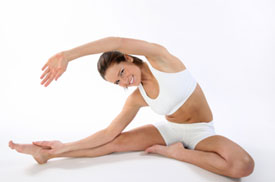Stretching exercise is a topic that is generally misunderstood by those not familiar with it. When we talk about a stretch of the body, some people think it is about actually pulling the tissues to make them longer. This is not what really happens.
What is Stretching?
This is what I call flexibility fitness, teaching the body, more specifically the nervous system to allow the muscles to relax at their full length. So in fact we are training the body to physically relax and not be tight all of the time.
Stretching and Injuries
The theory behind stretching and injuries is that when we increase range of motion, there is far less chance of injury because the muscle can function at it’s proper length. Thus a proper stretch is used both before and after workouts and athletic events.
The body has all kinds of defense mechanisms to protect you from injury. Most of the time these defenses work very well, but sometimes they are activated when there is no real threat to the body. This is how stretching and injuries are related, and why a proper flexibility fitness program can prevent them!
When you experience pain, however slight, or engage in exercise, your body responds by increasing muscle tension. The increased muscle tension causes a decrease in flexibility and is your body’s way of limiting muscle length to prevent overstretching or otherwise damaging the muscle.
We use stretching exercise to modify the activation of your body’s defense mechanisms so your muscles are not tight when they do not need to be! Your nervous system does many things to protect you, but we do not want it to unnecessarily limit you!
Notice how when you have pain, you don’t have the normal function of the muscles involved? This is your nervous system shutting the muscle down so that it does not get damaged. There are times when this response is appropriate, and other times when it is not.
Ever had a knee buckle or a shoulder give out when you were in pain? Again this is the body trying to protect itself from damage by shutting the muscle down. You feel this as a loss of strength or the muscle just refusing to do what you want it to do.
Your body does not know or understand when the danger is real or when it is not, so it responds based on basic neurological cues. We use stretching exercise to teach the body to relax and let go of the muscle tension, so we can use our muscles to their full capacity.
Types of Stretches
There are a number of types of stretches done for different purposes. The two main types of stretches are active and passive.
Active stretching involves doing the stretch yourself.
Passive Stretching involves another person stretching you while you try to relax.
Assisted stretching is a combination of both, and requires another person to help perform the stretch.
All these types of stretches have value for flexibility fitness. Active is best for healthy individual such as athletes who stretch before training. Passive and assisted stretches are better for those with injuries that are being rehabilitated and are usually done by an experienced therapist or trainer.
Flexibility Fitness and Antiaging
I feel very strongly that stretching exercise has an important place in your antiaging program. I say this because there are subtle ways in which the loss of flexibility over time can degrade the quality of life.
Your posture and gait (how you walk) affects the health of your spine and joints possibly leading to tendinitis, arthritis, and other musculoskeletal problems. In our definition of antiaging, we want to live a healthy, active life, not just a long one.
The relationship between stretching and injuries in terms of injury prevention alone makes flexibility fitness a very important component of overall health! Given how simple and easy it is to stretch, it is something everyone should do.
You will want to take steps to keep your body flexible to avoid the limitations that many people have when they get older. This is very possible, with a short and simple program of stretching exercise that will give you full flexibility and mobility for all of your life!
Strength Training For Antiaging





